Global Business Environment: Drivers, Challenges, and Strategic Impact
VerifiedAdded on 2022/11/28
|11
|2590
|129
Report
AI Summary
This report provides a comprehensive analysis of the global business environment, examining key factors that drive global commerce and trade, including cost, market dynamics, environmental considerations, and competitive landscapes. It delves into the complexities of strategic challenges faced by organizations operating globally, utilizing tools like PESTLE analysis to assess political, economic, social, technological, legal, and environmental factors. The report further explores the impact of digital technology on business operations, and offers insights into overcoming challenges such as employment mobility and cultural diversity loss. The study uses SASOL as a case study. The report concludes with recommendations for organizations to navigate the complexities of the global market, emphasizing the importance of ethical globalization and the development of effective strategies and policies to enhance market share and profitability.
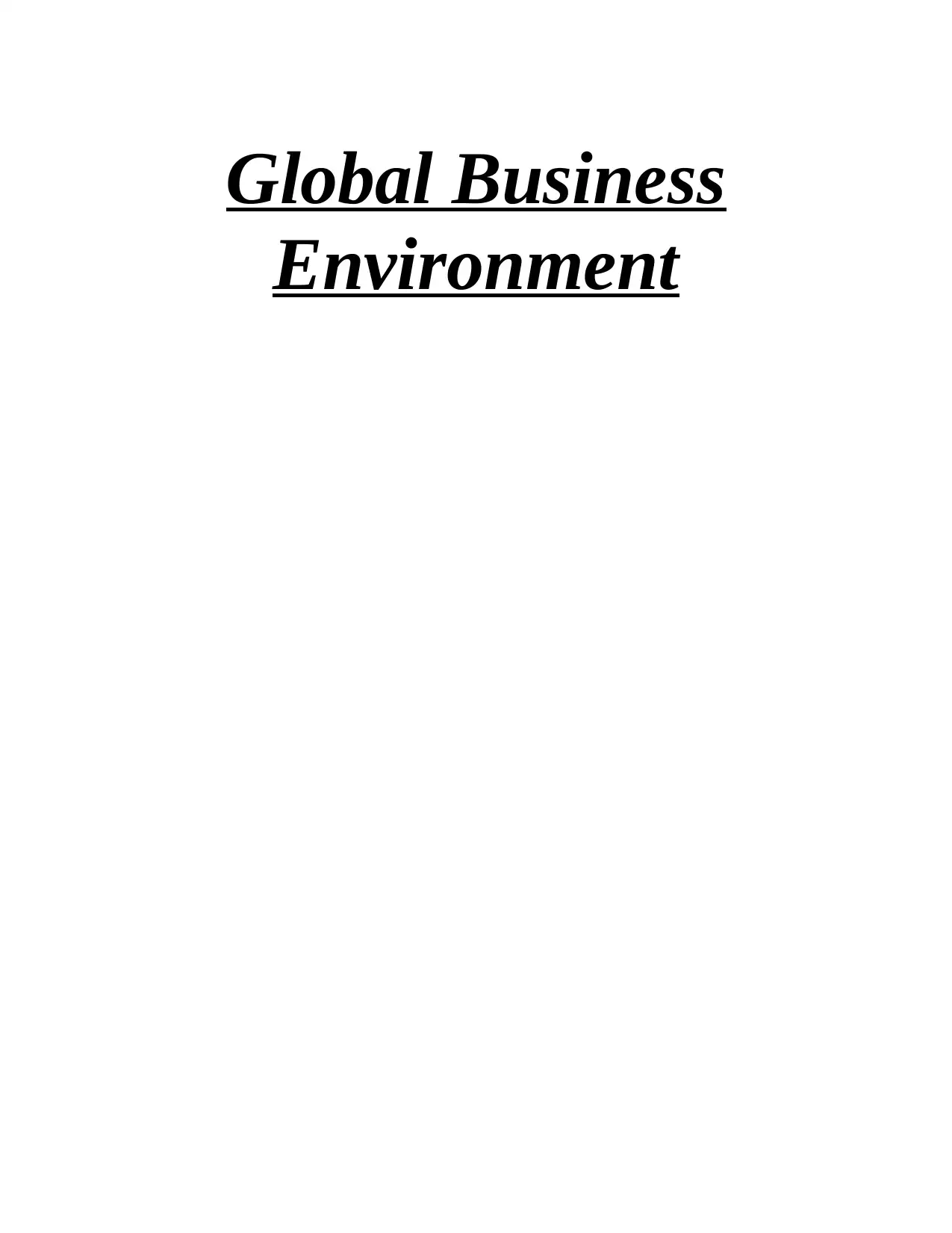
Global Business
Environment
Environment
Paraphrase This Document
Need a fresh take? Get an instant paraphrase of this document with our AI Paraphraser
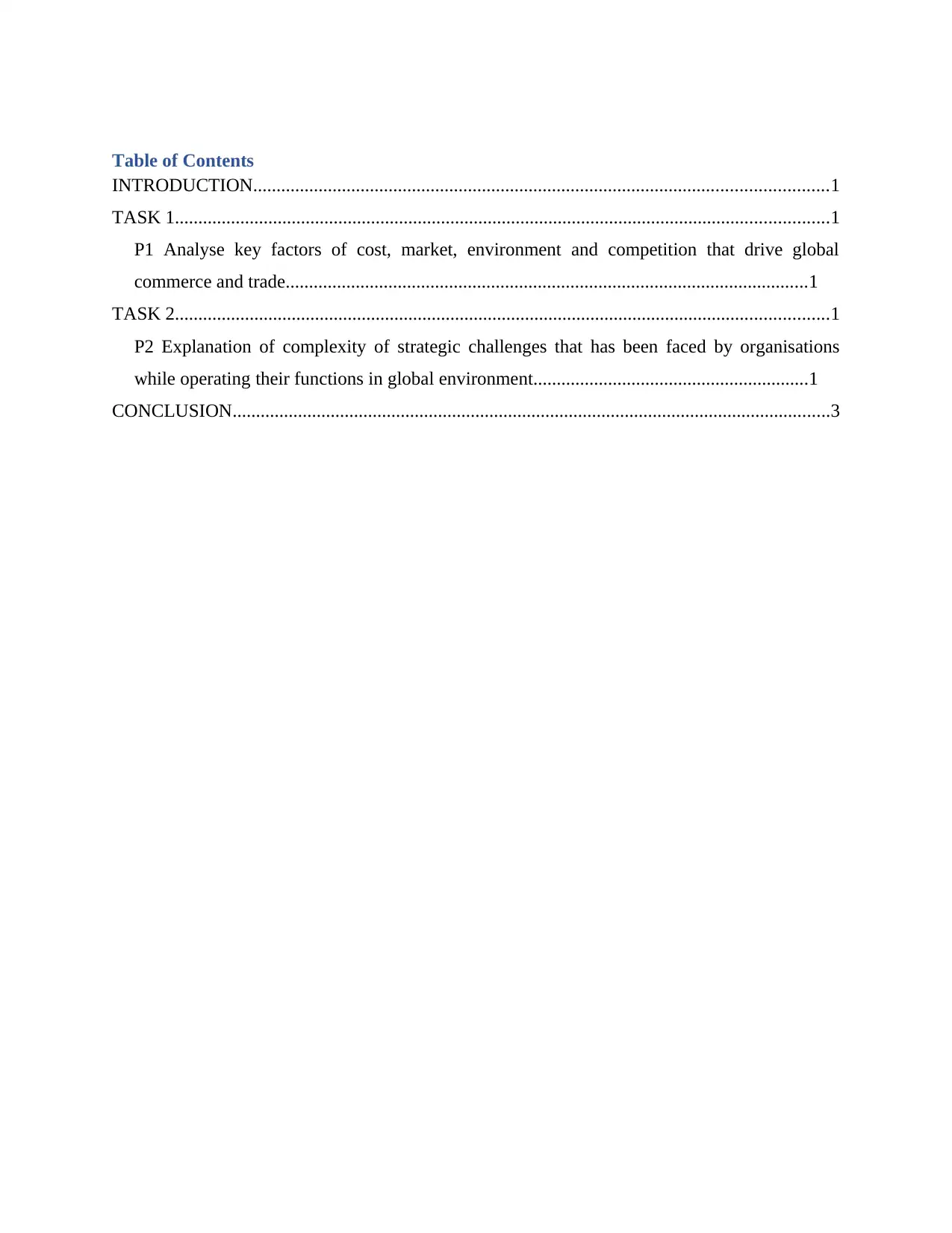
Table of Contents
INTRODUCTION...........................................................................................................................1
TASK 1............................................................................................................................................1
P1 Analyse key factors of cost, market, environment and competition that drive global
commerce and trade................................................................................................................1
TASK 2............................................................................................................................................1
P2 Explanation of complexity of strategic challenges that has been faced by organisations
while operating their functions in global environment...........................................................1
CONCLUSION................................................................................................................................3
INTRODUCTION...........................................................................................................................1
TASK 1............................................................................................................................................1
P1 Analyse key factors of cost, market, environment and competition that drive global
commerce and trade................................................................................................................1
TASK 2............................................................................................................................................1
P2 Explanation of complexity of strategic challenges that has been faced by organisations
while operating their functions in global environment...........................................................1
CONCLUSION................................................................................................................................3
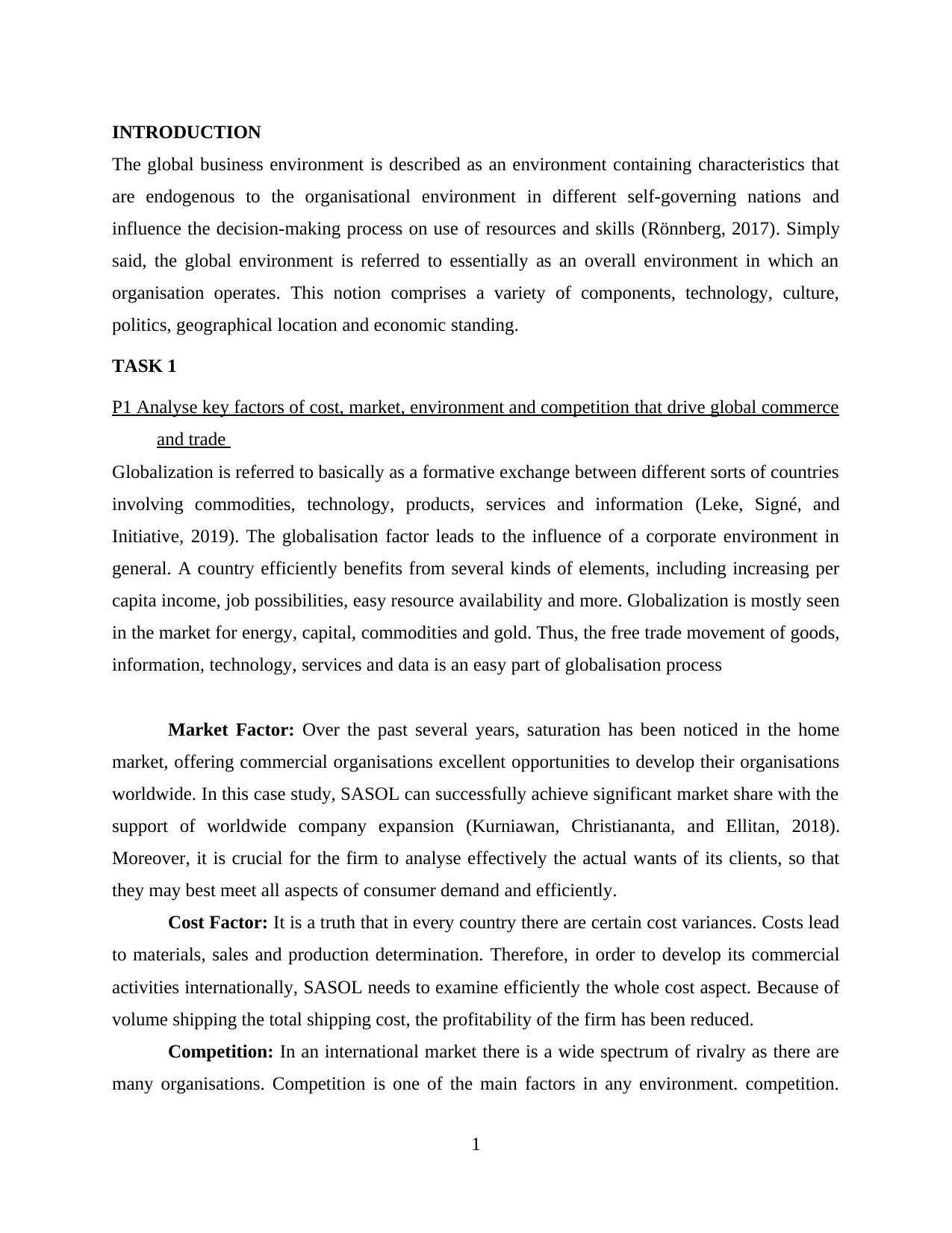
INTRODUCTION
The global business environment is described as an environment containing characteristics that
are endogenous to the organisational environment in different self-governing nations and
influence the decision-making process on use of resources and skills (Rönnberg, 2017). Simply
said, the global environment is referred to essentially as an overall environment in which an
organisation operates. This notion comprises a variety of components, technology, culture,
politics, geographical location and economic standing.
TASK 1
P1 Analyse key factors of cost, market, environment and competition that drive global commerce
and trade
Globalization is referred to basically as a formative exchange between different sorts of countries
involving commodities, technology, products, services and information (Leke, Signé, and
Initiative, 2019). The globalisation factor leads to the influence of a corporate environment in
general. A country efficiently benefits from several kinds of elements, including increasing per
capita income, job possibilities, easy resource availability and more. Globalization is mostly seen
in the market for energy, capital, commodities and gold. Thus, the free trade movement of goods,
information, technology, services and data is an easy part of globalisation process
Market Factor: Over the past several years, saturation has been noticed in the home
market, offering commercial organisations excellent opportunities to develop their organisations
worldwide. In this case study, SASOL can successfully achieve significant market share with the
support of worldwide company expansion (Kurniawan, Christiananta, and Ellitan, 2018).
Moreover, it is crucial for the firm to analyse effectively the actual wants of its clients, so that
they may best meet all aspects of consumer demand and efficiently.
Cost Factor: It is a truth that in every country there are certain cost variances. Costs lead
to materials, sales and production determination. Therefore, in order to develop its commercial
activities internationally, SASOL needs to examine efficiently the whole cost aspect. Because of
volume shipping the total shipping cost, the profitability of the firm has been reduced.
Competition: In an international market there is a wide spectrum of rivalry as there are
many organisations. Competition is one of the main factors in any environment. competition.
1
The global business environment is described as an environment containing characteristics that
are endogenous to the organisational environment in different self-governing nations and
influence the decision-making process on use of resources and skills (Rönnberg, 2017). Simply
said, the global environment is referred to essentially as an overall environment in which an
organisation operates. This notion comprises a variety of components, technology, culture,
politics, geographical location and economic standing.
TASK 1
P1 Analyse key factors of cost, market, environment and competition that drive global commerce
and trade
Globalization is referred to basically as a formative exchange between different sorts of countries
involving commodities, technology, products, services and information (Leke, Signé, and
Initiative, 2019). The globalisation factor leads to the influence of a corporate environment in
general. A country efficiently benefits from several kinds of elements, including increasing per
capita income, job possibilities, easy resource availability and more. Globalization is mostly seen
in the market for energy, capital, commodities and gold. Thus, the free trade movement of goods,
information, technology, services and data is an easy part of globalisation process
Market Factor: Over the past several years, saturation has been noticed in the home
market, offering commercial organisations excellent opportunities to develop their organisations
worldwide. In this case study, SASOL can successfully achieve significant market share with the
support of worldwide company expansion (Kurniawan, Christiananta, and Ellitan, 2018).
Moreover, it is crucial for the firm to analyse effectively the actual wants of its clients, so that
they may best meet all aspects of consumer demand and efficiently.
Cost Factor: It is a truth that in every country there are certain cost variances. Costs lead
to materials, sales and production determination. Therefore, in order to develop its commercial
activities internationally, SASOL needs to examine efficiently the whole cost aspect. Because of
volume shipping the total shipping cost, the profitability of the firm has been reduced.
Competition: In an international market there is a wide spectrum of rivalry as there are
many organisations. Competition is one of the main factors in any environment. competition.
1
⊘ This is a preview!⊘
Do you want full access?
Subscribe today to unlock all pages.

Trusted by 1+ million students worldwide
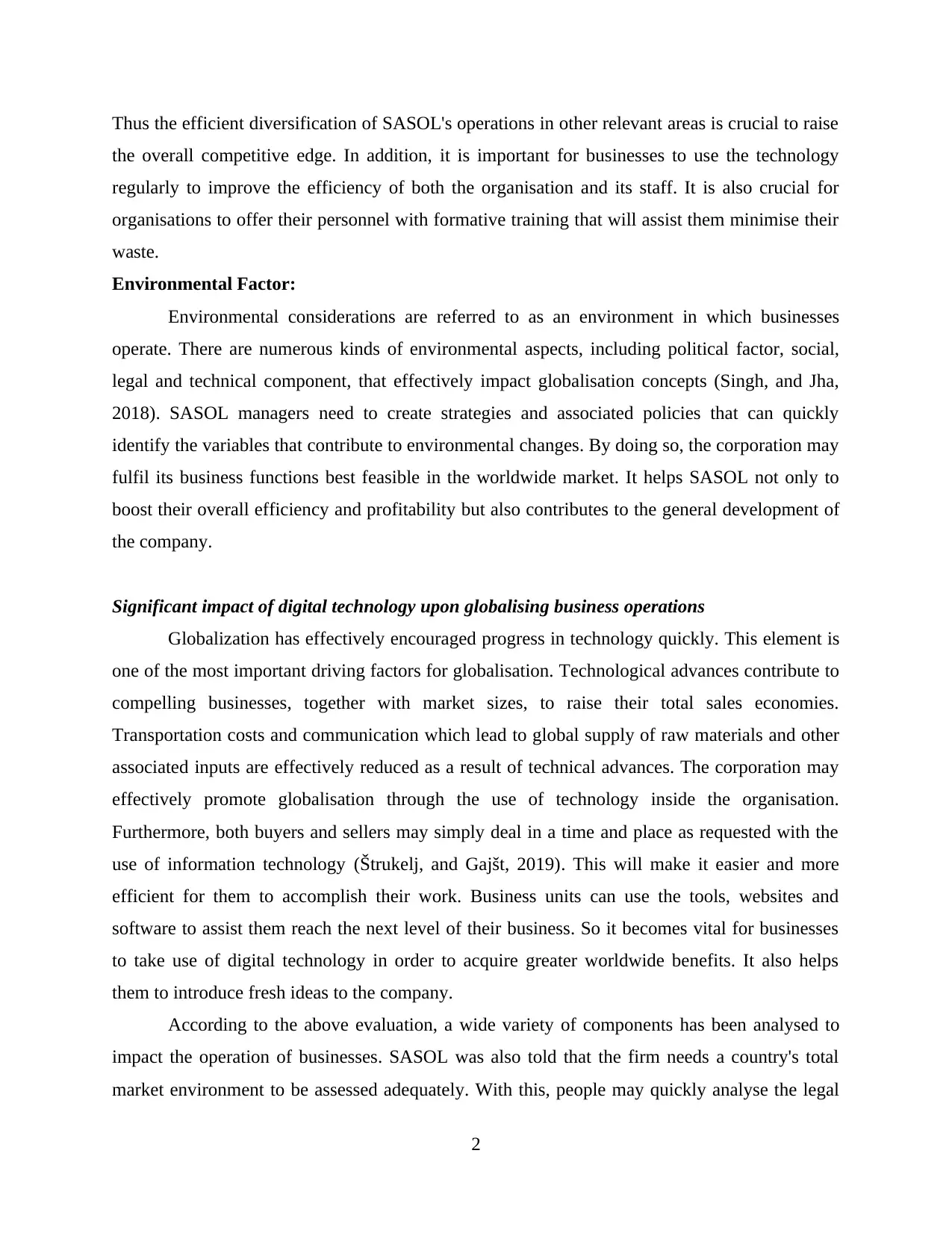
Thus the efficient diversification of SASOL's operations in other relevant areas is crucial to raise
the overall competitive edge. In addition, it is important for businesses to use the technology
regularly to improve the efficiency of both the organisation and its staff. It is also crucial for
organisations to offer their personnel with formative training that will assist them minimise their
waste.
Environmental Factor:
Environmental considerations are referred to as an environment in which businesses
operate. There are numerous kinds of environmental aspects, including political factor, social,
legal and technical component, that effectively impact globalisation concepts (Singh, and Jha,
2018). SASOL managers need to create strategies and associated policies that can quickly
identify the variables that contribute to environmental changes. By doing so, the corporation may
fulfil its business functions best feasible in the worldwide market. It helps SASOL not only to
boost their overall efficiency and profitability but also contributes to the general development of
the company.
Significant impact of digital technology upon globalising business operations
Globalization has effectively encouraged progress in technology quickly. This element is
one of the most important driving factors for globalisation. Technological advances contribute to
compelling businesses, together with market sizes, to raise their total sales economies.
Transportation costs and communication which lead to global supply of raw materials and other
associated inputs are effectively reduced as a result of technical advances. The corporation may
effectively promote globalisation through the use of technology inside the organisation.
Furthermore, both buyers and sellers may simply deal in a time and place as requested with the
use of information technology (Štrukelj, and Gajšt, 2019). This will make it easier and more
efficient for them to accomplish their work. Business units can use the tools, websites and
software to assist them reach the next level of their business. So it becomes vital for businesses
to take use of digital technology in order to acquire greater worldwide benefits. It also helps
them to introduce fresh ideas to the company.
According to the above evaluation, a wide variety of components has been analysed to
impact the operation of businesses. SASOL was also told that the firm needs a country's total
market environment to be assessed adequately. With this, people may quickly analyse the legal
2
the overall competitive edge. In addition, it is important for businesses to use the technology
regularly to improve the efficiency of both the organisation and its staff. It is also crucial for
organisations to offer their personnel with formative training that will assist them minimise their
waste.
Environmental Factor:
Environmental considerations are referred to as an environment in which businesses
operate. There are numerous kinds of environmental aspects, including political factor, social,
legal and technical component, that effectively impact globalisation concepts (Singh, and Jha,
2018). SASOL managers need to create strategies and associated policies that can quickly
identify the variables that contribute to environmental changes. By doing so, the corporation may
fulfil its business functions best feasible in the worldwide market. It helps SASOL not only to
boost their overall efficiency and profitability but also contributes to the general development of
the company.
Significant impact of digital technology upon globalising business operations
Globalization has effectively encouraged progress in technology quickly. This element is
one of the most important driving factors for globalisation. Technological advances contribute to
compelling businesses, together with market sizes, to raise their total sales economies.
Transportation costs and communication which lead to global supply of raw materials and other
associated inputs are effectively reduced as a result of technical advances. The corporation may
effectively promote globalisation through the use of technology inside the organisation.
Furthermore, both buyers and sellers may simply deal in a time and place as requested with the
use of information technology (Štrukelj, and Gajšt, 2019). This will make it easier and more
efficient for them to accomplish their work. Business units can use the tools, websites and
software to assist them reach the next level of their business. So it becomes vital for businesses
to take use of digital technology in order to acquire greater worldwide benefits. It also helps
them to introduce fresh ideas to the company.
According to the above evaluation, a wide variety of components has been analysed to
impact the operation of businesses. SASOL was also told that the firm needs a country's total
market environment to be assessed adequately. With this, people may quickly analyse the legal
2
Paraphrase This Document
Need a fresh take? Get an instant paraphrase of this document with our AI Paraphraser
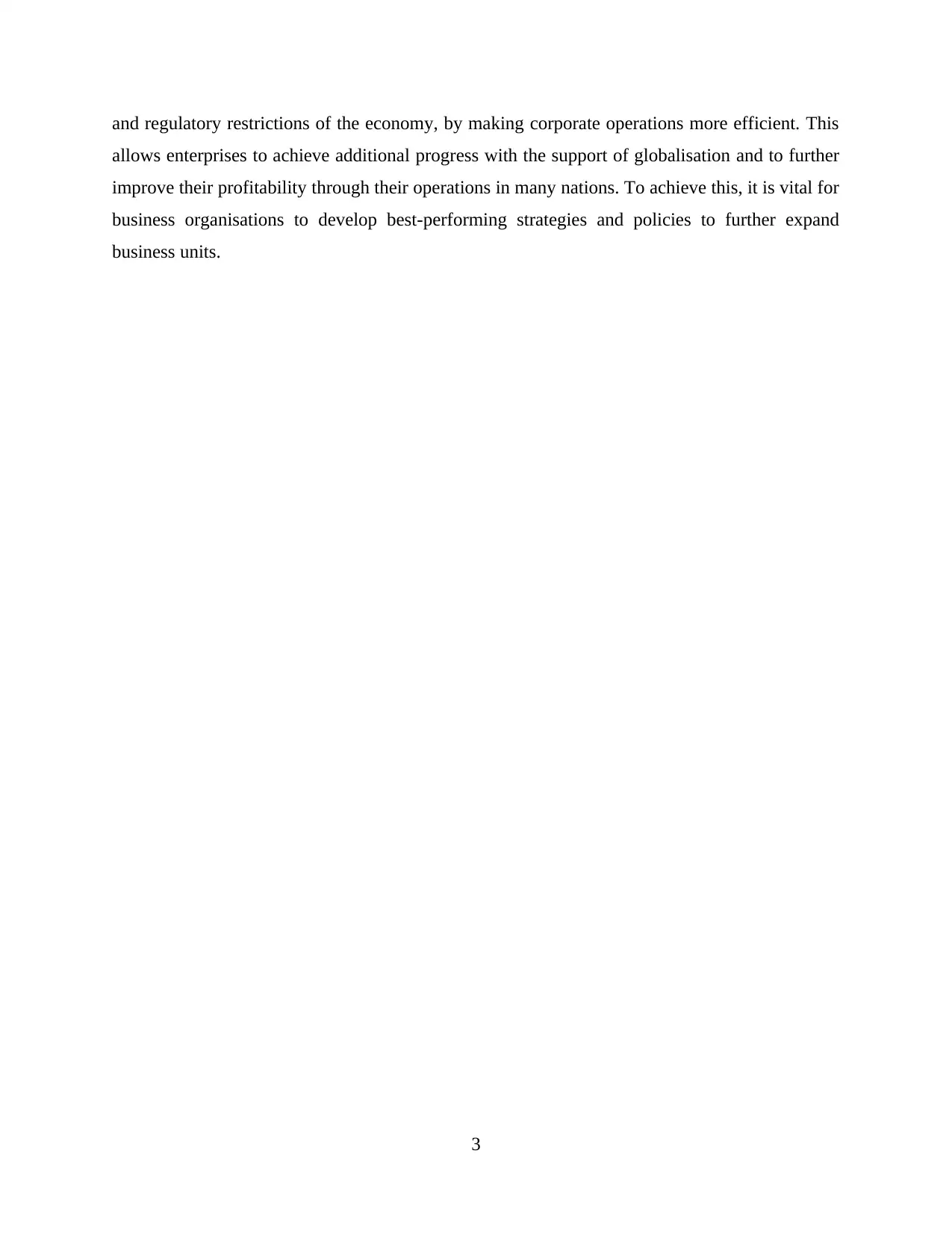
and regulatory restrictions of the economy, by making corporate operations more efficient. This
allows enterprises to achieve additional progress with the support of globalisation and to further
improve their profitability through their operations in many nations. To achieve this, it is vital for
business organisations to develop best-performing strategies and policies to further expand
business units.
3
allows enterprises to achieve additional progress with the support of globalisation and to further
improve their profitability through their operations in many nations. To achieve this, it is vital for
business organisations to develop best-performing strategies and policies to further expand
business units.
3
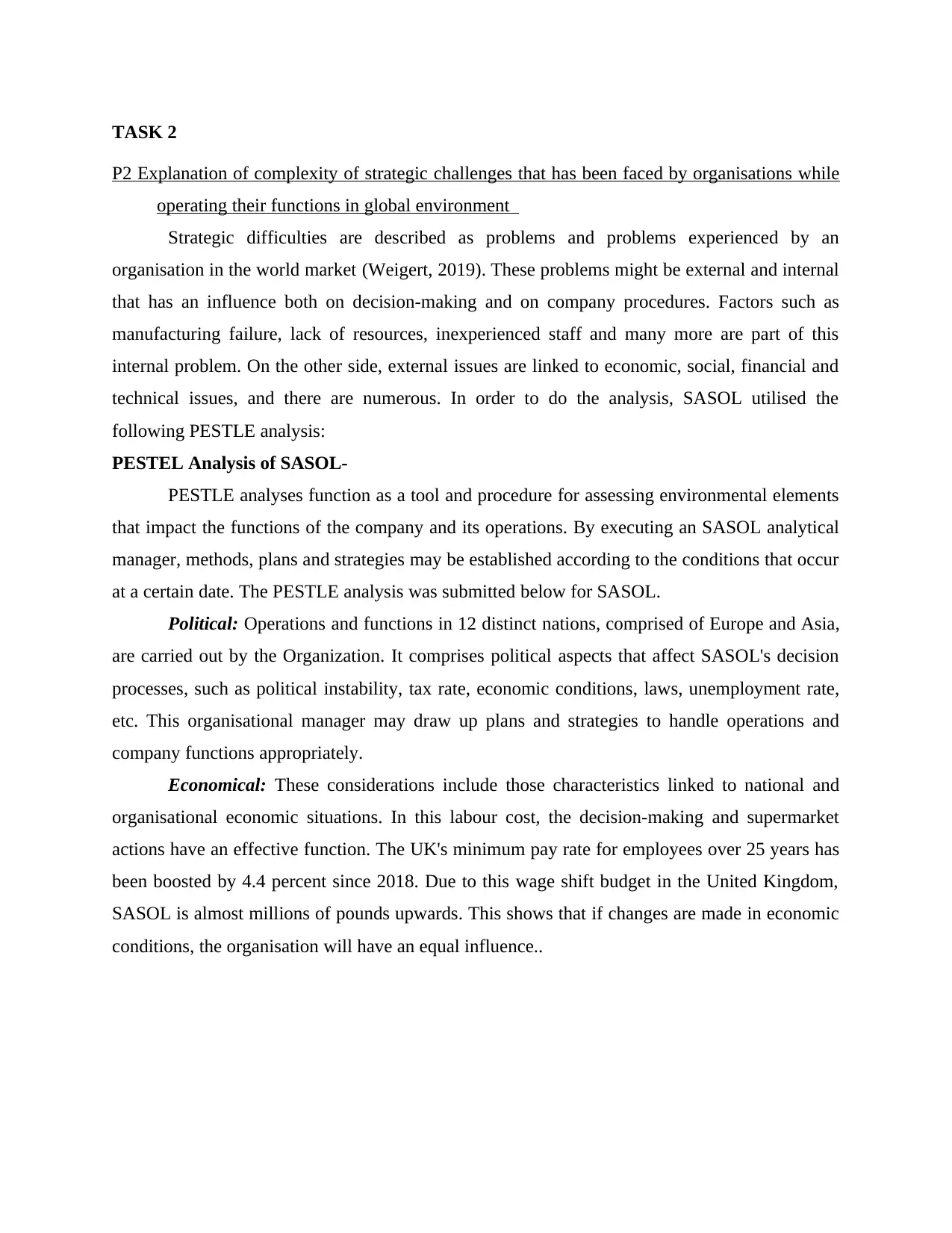
TASK 2
P2 Explanation of complexity of strategic challenges that has been faced by organisations while
operating their functions in global environment
Strategic difficulties are described as problems and problems experienced by an
organisation in the world market (Weigert, 2019). These problems might be external and internal
that has an influence both on decision-making and on company procedures. Factors such as
manufacturing failure, lack of resources, inexperienced staff and many more are part of this
internal problem. On the other side, external issues are linked to economic, social, financial and
technical issues, and there are numerous. In order to do the analysis, SASOL utilised the
following PESTLE analysis:
PESTEL Analysis of SASOL-
PESTLE analyses function as a tool and procedure for assessing environmental elements
that impact the functions of the company and its operations. By executing an SASOL analytical
manager, methods, plans and strategies may be established according to the conditions that occur
at a certain date. The PESTLE analysis was submitted below for SASOL.
Political: Operations and functions in 12 distinct nations, comprised of Europe and Asia,
are carried out by the Organization. It comprises political aspects that affect SASOL's decision
processes, such as political instability, tax rate, economic conditions, laws, unemployment rate,
etc. This organisational manager may draw up plans and strategies to handle operations and
company functions appropriately.
Economical: These considerations include those characteristics linked to national and
organisational economic situations. In this labour cost, the decision-making and supermarket
actions have an effective function. The UK's minimum pay rate for employees over 25 years has
been boosted by 4.4 percent since 2018. Due to this wage shift budget in the United Kingdom,
SASOL is almost millions of pounds upwards. This shows that if changes are made in economic
conditions, the organisation will have an equal influence..
P2 Explanation of complexity of strategic challenges that has been faced by organisations while
operating their functions in global environment
Strategic difficulties are described as problems and problems experienced by an
organisation in the world market (Weigert, 2019). These problems might be external and internal
that has an influence both on decision-making and on company procedures. Factors such as
manufacturing failure, lack of resources, inexperienced staff and many more are part of this
internal problem. On the other side, external issues are linked to economic, social, financial and
technical issues, and there are numerous. In order to do the analysis, SASOL utilised the
following PESTLE analysis:
PESTEL Analysis of SASOL-
PESTLE analyses function as a tool and procedure for assessing environmental elements
that impact the functions of the company and its operations. By executing an SASOL analytical
manager, methods, plans and strategies may be established according to the conditions that occur
at a certain date. The PESTLE analysis was submitted below for SASOL.
Political: Operations and functions in 12 distinct nations, comprised of Europe and Asia,
are carried out by the Organization. It comprises political aspects that affect SASOL's decision
processes, such as political instability, tax rate, economic conditions, laws, unemployment rate,
etc. This organisational manager may draw up plans and strategies to handle operations and
company functions appropriately.
Economical: These considerations include those characteristics linked to national and
organisational economic situations. In this labour cost, the decision-making and supermarket
actions have an effective function. The UK's minimum pay rate for employees over 25 years has
been boosted by 4.4 percent since 2018. Due to this wage shift budget in the United Kingdom,
SASOL is almost millions of pounds upwards. This shows that if changes are made in economic
conditions, the organisation will have an equal influence..
⊘ This is a preview!⊘
Do you want full access?
Subscribe today to unlock all pages.

Trusted by 1+ million students worldwide
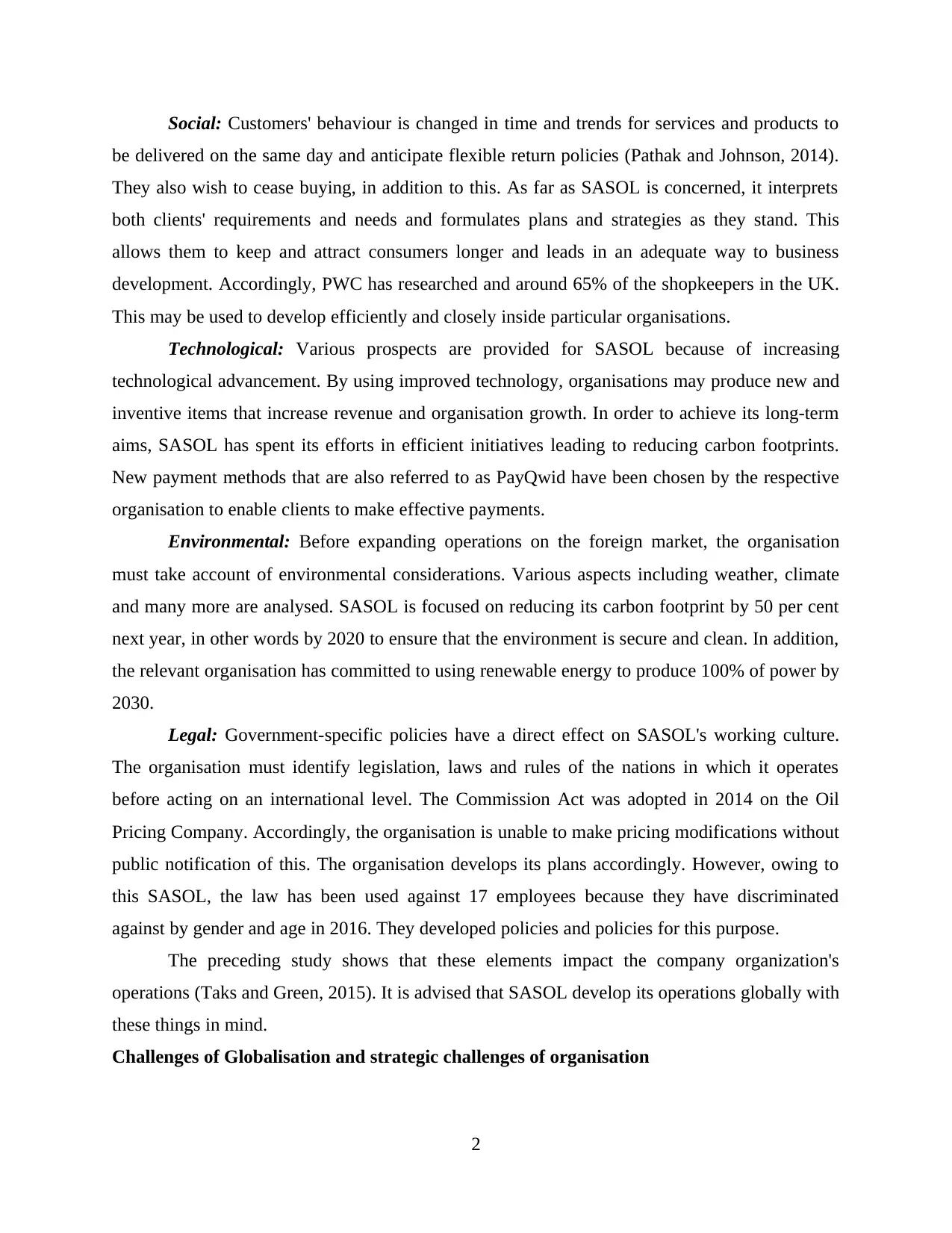
Social: Customers' behaviour is changed in time and trends for services and products to
be delivered on the same day and anticipate flexible return policies (Pathak and Johnson, 2014).
They also wish to cease buying, in addition to this. As far as SASOL is concerned, it interprets
both clients' requirements and needs and formulates plans and strategies as they stand. This
allows them to keep and attract consumers longer and leads in an adequate way to business
development. Accordingly, PWC has researched and around 65% of the shopkeepers in the UK.
This may be used to develop efficiently and closely inside particular organisations.
Technological: Various prospects are provided for SASOL because of increasing
technological advancement. By using improved technology, organisations may produce new and
inventive items that increase revenue and organisation growth. In order to achieve its long-term
aims, SASOL has spent its efforts in efficient initiatives leading to reducing carbon footprints.
New payment methods that are also referred to as PayQwid have been chosen by the respective
organisation to enable clients to make effective payments.
Environmental: Before expanding operations on the foreign market, the organisation
must take account of environmental considerations. Various aspects including weather, climate
and many more are analysed. SASOL is focused on reducing its carbon footprint by 50 per cent
next year, in other words by 2020 to ensure that the environment is secure and clean. In addition,
the relevant organisation has committed to using renewable energy to produce 100% of power by
2030.
Legal: Government-specific policies have a direct effect on SASOL's working culture.
The organisation must identify legislation, laws and rules of the nations in which it operates
before acting on an international level. The Commission Act was adopted in 2014 on the Oil
Pricing Company. Accordingly, the organisation is unable to make pricing modifications without
public notification of this. The organisation develops its plans accordingly. However, owing to
this SASOL, the law has been used against 17 employees because they have discriminated
against by gender and age in 2016. They developed policies and policies for this purpose.
The preceding study shows that these elements impact the company organization's
operations (Taks and Green, 2015). It is advised that SASOL develop its operations globally with
these things in mind.
Challenges of Globalisation and strategic challenges of organisation
2
be delivered on the same day and anticipate flexible return policies (Pathak and Johnson, 2014).
They also wish to cease buying, in addition to this. As far as SASOL is concerned, it interprets
both clients' requirements and needs and formulates plans and strategies as they stand. This
allows them to keep and attract consumers longer and leads in an adequate way to business
development. Accordingly, PWC has researched and around 65% of the shopkeepers in the UK.
This may be used to develop efficiently and closely inside particular organisations.
Technological: Various prospects are provided for SASOL because of increasing
technological advancement. By using improved technology, organisations may produce new and
inventive items that increase revenue and organisation growth. In order to achieve its long-term
aims, SASOL has spent its efforts in efficient initiatives leading to reducing carbon footprints.
New payment methods that are also referred to as PayQwid have been chosen by the respective
organisation to enable clients to make effective payments.
Environmental: Before expanding operations on the foreign market, the organisation
must take account of environmental considerations. Various aspects including weather, climate
and many more are analysed. SASOL is focused on reducing its carbon footprint by 50 per cent
next year, in other words by 2020 to ensure that the environment is secure and clean. In addition,
the relevant organisation has committed to using renewable energy to produce 100% of power by
2030.
Legal: Government-specific policies have a direct effect on SASOL's working culture.
The organisation must identify legislation, laws and rules of the nations in which it operates
before acting on an international level. The Commission Act was adopted in 2014 on the Oil
Pricing Company. Accordingly, the organisation is unable to make pricing modifications without
public notification of this. The organisation develops its plans accordingly. However, owing to
this SASOL, the law has been used against 17 employees because they have discriminated
against by gender and age in 2016. They developed policies and policies for this purpose.
The preceding study shows that these elements impact the company organization's
operations (Taks and Green, 2015). It is advised that SASOL develop its operations globally with
these things in mind.
Challenges of Globalisation and strategic challenges of organisation
2
Paraphrase This Document
Need a fresh take? Get an instant paraphrase of this document with our AI Paraphraser
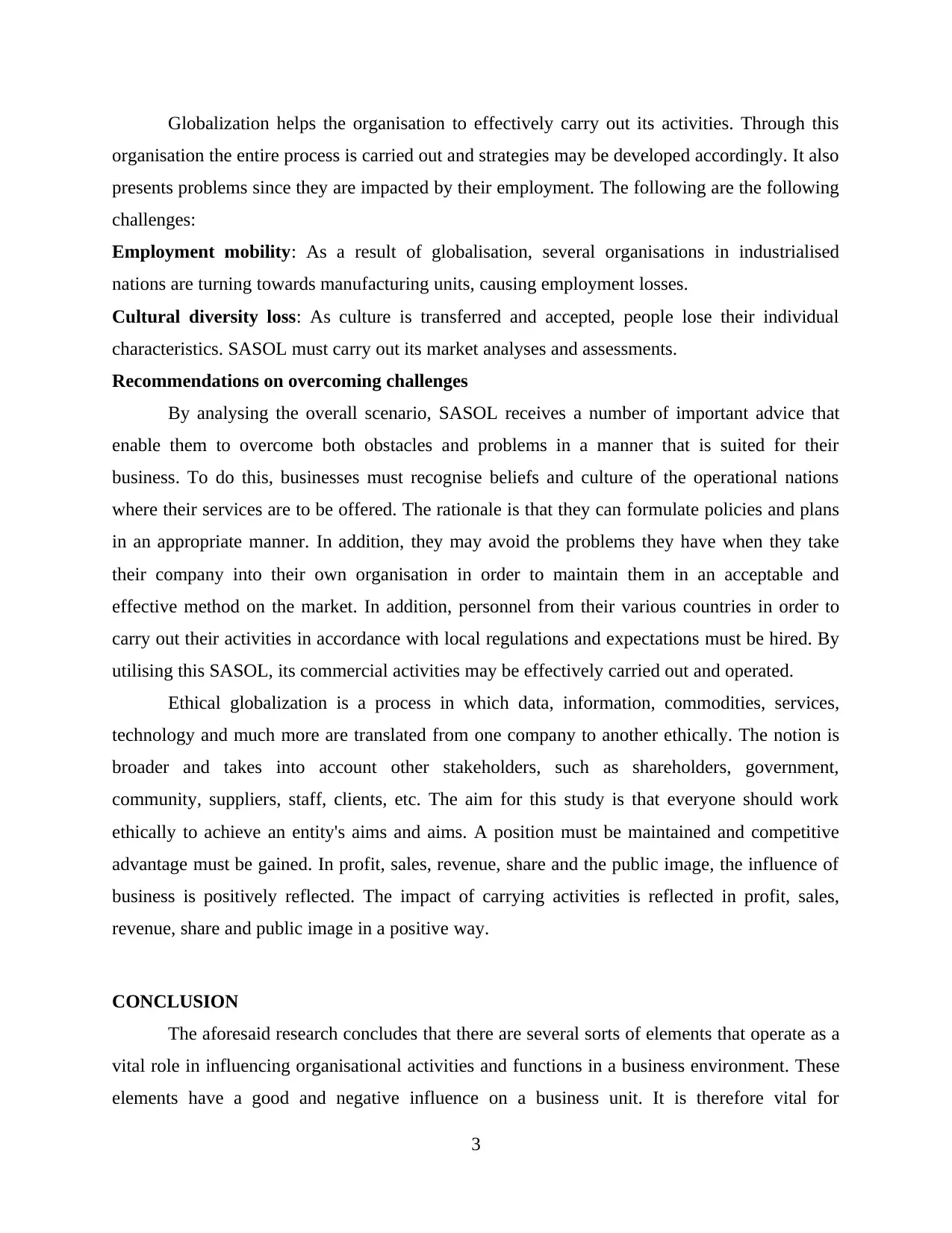
Globalization helps the organisation to effectively carry out its activities. Through this
organisation the entire process is carried out and strategies may be developed accordingly. It also
presents problems since they are impacted by their employment. The following are the following
challenges:
Employment mobility: As a result of globalisation, several organisations in industrialised
nations are turning towards manufacturing units, causing employment losses.
Cultural diversity loss: As culture is transferred and accepted, people lose their individual
characteristics. SASOL must carry out its market analyses and assessments.
Recommendations on overcoming challenges
By analysing the overall scenario, SASOL receives a number of important advice that
enable them to overcome both obstacles and problems in a manner that is suited for their
business. To do this, businesses must recognise beliefs and culture of the operational nations
where their services are to be offered. The rationale is that they can formulate policies and plans
in an appropriate manner. In addition, they may avoid the problems they have when they take
their company into their own organisation in order to maintain them in an acceptable and
effective method on the market. In addition, personnel from their various countries in order to
carry out their activities in accordance with local regulations and expectations must be hired. By
utilising this SASOL, its commercial activities may be effectively carried out and operated.
Ethical globalization is a process in which data, information, commodities, services,
technology and much more are translated from one company to another ethically. The notion is
broader and takes into account other stakeholders, such as shareholders, government,
community, suppliers, staff, clients, etc. The aim for this study is that everyone should work
ethically to achieve an entity's aims and aims. A position must be maintained and competitive
advantage must be gained. In profit, sales, revenue, share and the public image, the influence of
business is positively reflected. The impact of carrying activities is reflected in profit, sales,
revenue, share and public image in a positive way.
CONCLUSION
The aforesaid research concludes that there are several sorts of elements that operate as a
vital role in influencing organisational activities and functions in a business environment. These
elements have a good and negative influence on a business unit. It is therefore vital for
3
organisation the entire process is carried out and strategies may be developed accordingly. It also
presents problems since they are impacted by their employment. The following are the following
challenges:
Employment mobility: As a result of globalisation, several organisations in industrialised
nations are turning towards manufacturing units, causing employment losses.
Cultural diversity loss: As culture is transferred and accepted, people lose their individual
characteristics. SASOL must carry out its market analyses and assessments.
Recommendations on overcoming challenges
By analysing the overall scenario, SASOL receives a number of important advice that
enable them to overcome both obstacles and problems in a manner that is suited for their
business. To do this, businesses must recognise beliefs and culture of the operational nations
where their services are to be offered. The rationale is that they can formulate policies and plans
in an appropriate manner. In addition, they may avoid the problems they have when they take
their company into their own organisation in order to maintain them in an acceptable and
effective method on the market. In addition, personnel from their various countries in order to
carry out their activities in accordance with local regulations and expectations must be hired. By
utilising this SASOL, its commercial activities may be effectively carried out and operated.
Ethical globalization is a process in which data, information, commodities, services,
technology and much more are translated from one company to another ethically. The notion is
broader and takes into account other stakeholders, such as shareholders, government,
community, suppliers, staff, clients, etc. The aim for this study is that everyone should work
ethically to achieve an entity's aims and aims. A position must be maintained and competitive
advantage must be gained. In profit, sales, revenue, share and the public image, the influence of
business is positively reflected. The impact of carrying activities is reflected in profit, sales,
revenue, share and public image in a positive way.
CONCLUSION
The aforesaid research concludes that there are several sorts of elements that operate as a
vital role in influencing organisational activities and functions in a business environment. These
elements have a good and negative influence on a business unit. It is therefore vital for
3
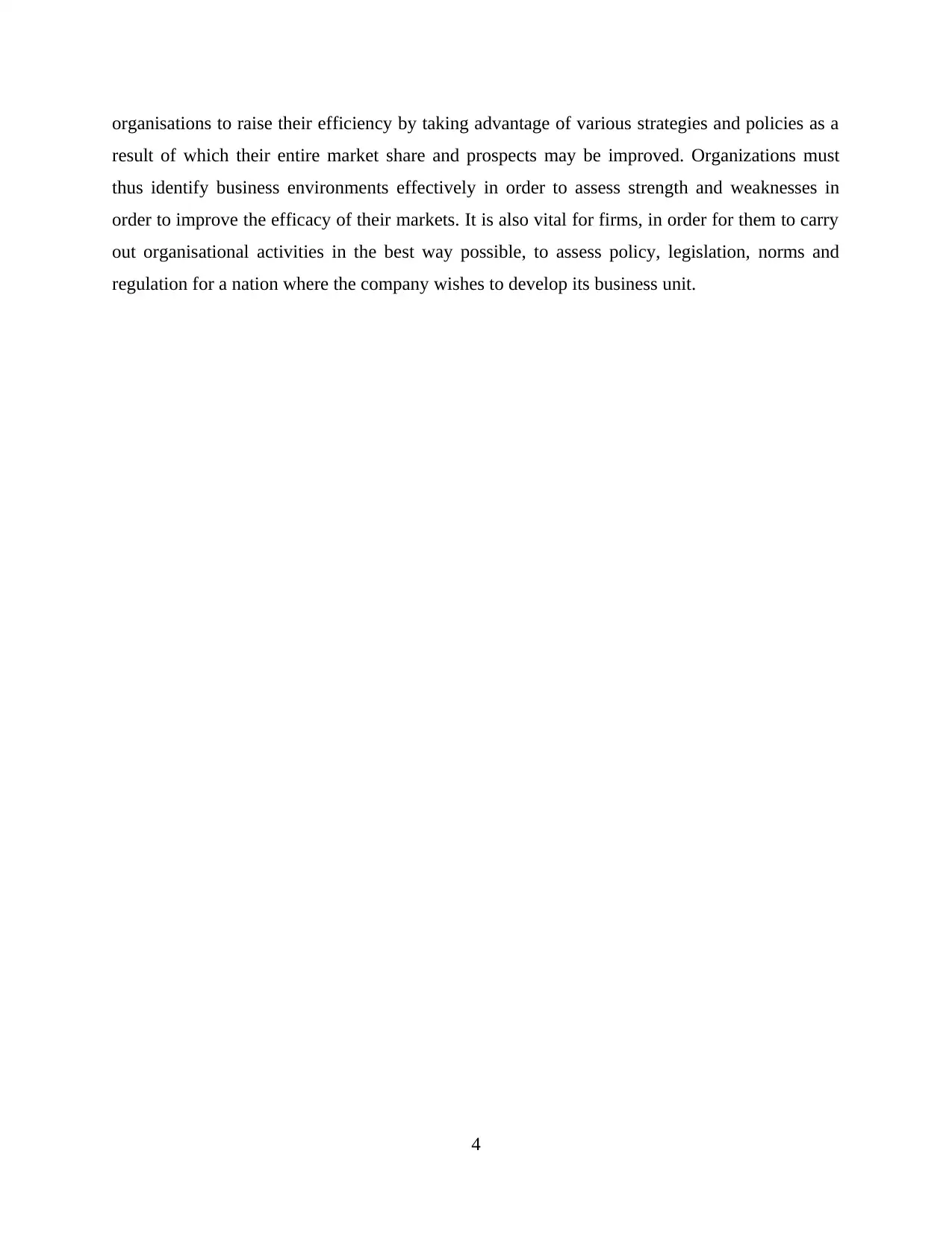
organisations to raise their efficiency by taking advantage of various strategies and policies as a
result of which their entire market share and prospects may be improved. Organizations must
thus identify business environments effectively in order to assess strength and weaknesses in
order to improve the efficacy of their markets. It is also vital for firms, in order for them to carry
out organisational activities in the best way possible, to assess policy, legislation, norms and
regulation for a nation where the company wishes to develop its business unit.
4
result of which their entire market share and prospects may be improved. Organizations must
thus identify business environments effectively in order to assess strength and weaknesses in
order to improve the efficacy of their markets. It is also vital for firms, in order for them to carry
out organisational activities in the best way possible, to assess policy, legislation, norms and
regulation for a nation where the company wishes to develop its business unit.
4
⊘ This is a preview!⊘
Do you want full access?
Subscribe today to unlock all pages.

Trusted by 1+ million students worldwide
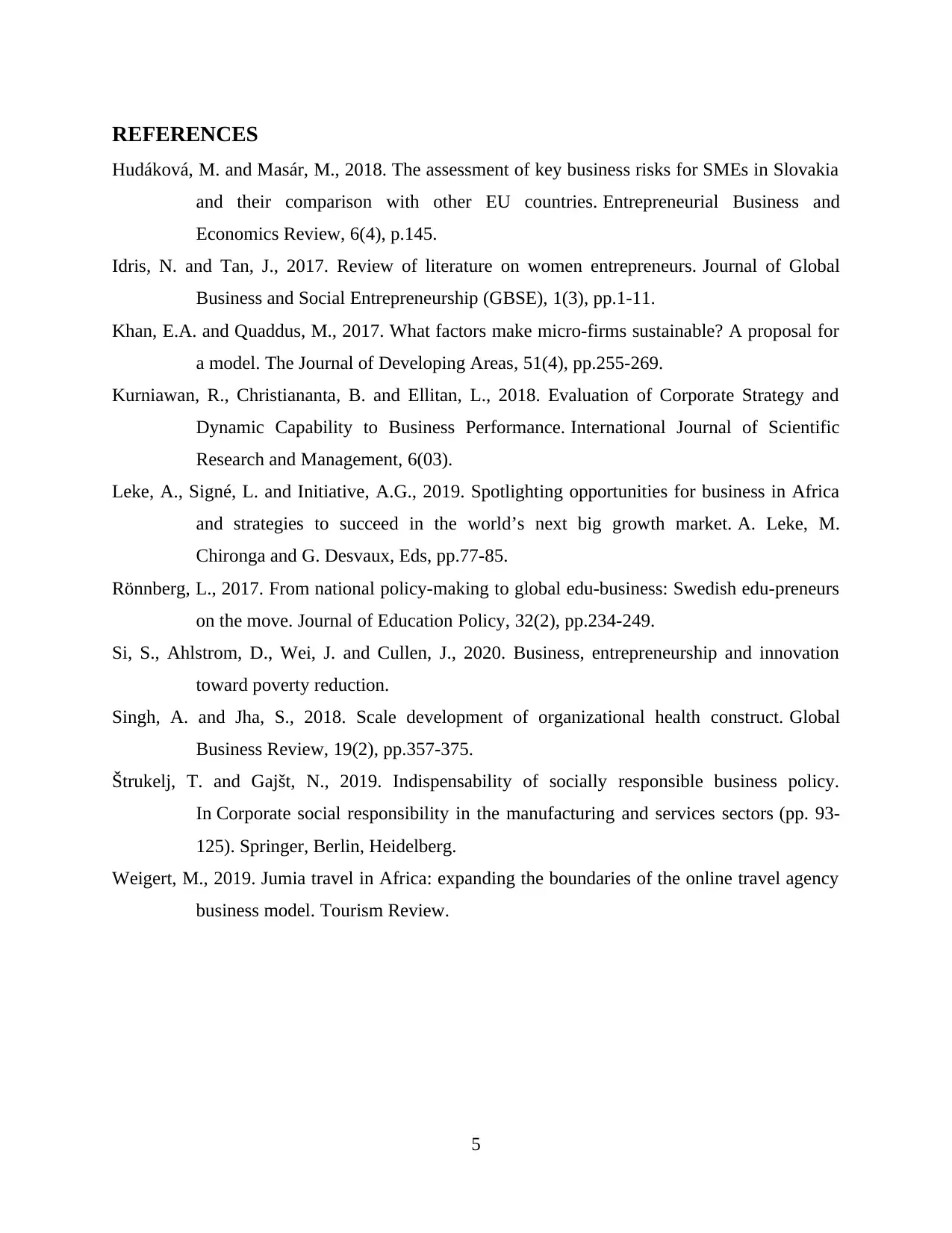
REFERENCES
Hudáková, M. and Masár, M., 2018. The assessment of key business risks for SMEs in Slovakia
and their comparison with other EU countries. Entrepreneurial Business and
Economics Review, 6(4), p.145.
Idris, N. and Tan, J., 2017. Review of literature on women entrepreneurs. Journal of Global
Business and Social Entrepreneurship (GBSE), 1(3), pp.1-11.
Khan, E.A. and Quaddus, M., 2017. What factors make micro-firms sustainable? A proposal for
a model. The Journal of Developing Areas, 51(4), pp.255-269.
Kurniawan, R., Christiananta, B. and Ellitan, L., 2018. Evaluation of Corporate Strategy and
Dynamic Capability to Business Performance. International Journal of Scientific
Research and Management, 6(03).
Leke, A., Signé, L. and Initiative, A.G., 2019. Spotlighting opportunities for business in Africa
and strategies to succeed in the world’s next big growth market. A. Leke, M.
Chironga and G. Desvaux, Eds, pp.77-85.
Rönnberg, L., 2017. From national policy-making to global edu-business: Swedish edu-preneurs
on the move. Journal of Education Policy, 32(2), pp.234-249.
Si, S., Ahlstrom, D., Wei, J. and Cullen, J., 2020. Business, entrepreneurship and innovation
toward poverty reduction.
Singh, A. and Jha, S., 2018. Scale development of organizational health construct. Global
Business Review, 19(2), pp.357-375.
Štrukelj, T. and Gajšt, N., 2019. Indispensability of socially responsible business policy.
In Corporate social responsibility in the manufacturing and services sectors (pp. 93-
125). Springer, Berlin, Heidelberg.
Weigert, M., 2019. Jumia travel in Africa: expanding the boundaries of the online travel agency
business model. Tourism Review.
5
Hudáková, M. and Masár, M., 2018. The assessment of key business risks for SMEs in Slovakia
and their comparison with other EU countries. Entrepreneurial Business and
Economics Review, 6(4), p.145.
Idris, N. and Tan, J., 2017. Review of literature on women entrepreneurs. Journal of Global
Business and Social Entrepreneurship (GBSE), 1(3), pp.1-11.
Khan, E.A. and Quaddus, M., 2017. What factors make micro-firms sustainable? A proposal for
a model. The Journal of Developing Areas, 51(4), pp.255-269.
Kurniawan, R., Christiananta, B. and Ellitan, L., 2018. Evaluation of Corporate Strategy and
Dynamic Capability to Business Performance. International Journal of Scientific
Research and Management, 6(03).
Leke, A., Signé, L. and Initiative, A.G., 2019. Spotlighting opportunities for business in Africa
and strategies to succeed in the world’s next big growth market. A. Leke, M.
Chironga and G. Desvaux, Eds, pp.77-85.
Rönnberg, L., 2017. From national policy-making to global edu-business: Swedish edu-preneurs
on the move. Journal of Education Policy, 32(2), pp.234-249.
Si, S., Ahlstrom, D., Wei, J. and Cullen, J., 2020. Business, entrepreneurship and innovation
toward poverty reduction.
Singh, A. and Jha, S., 2018. Scale development of organizational health construct. Global
Business Review, 19(2), pp.357-375.
Štrukelj, T. and Gajšt, N., 2019. Indispensability of socially responsible business policy.
In Corporate social responsibility in the manufacturing and services sectors (pp. 93-
125). Springer, Berlin, Heidelberg.
Weigert, M., 2019. Jumia travel in Africa: expanding the boundaries of the online travel agency
business model. Tourism Review.
5
Paraphrase This Document
Need a fresh take? Get an instant paraphrase of this document with our AI Paraphraser

6
1 out of 11
Related Documents
Your All-in-One AI-Powered Toolkit for Academic Success.
+13062052269
info@desklib.com
Available 24*7 on WhatsApp / Email
![[object Object]](/_next/static/media/star-bottom.7253800d.svg)
Unlock your academic potential
Copyright © 2020–2026 A2Z Services. All Rights Reserved. Developed and managed by ZUCOL.

